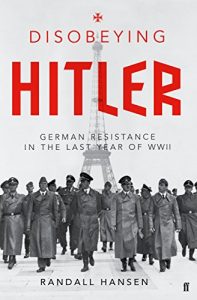In the last months of the war, Hitler ordered the poisoning, blocking, and wrecking of all ports across Europe; the destruction of all industries, railroads, bridges, utilities supplies, archives and museums in Europe; and the destruction of the most beautiful city in the world: Paris. Thanks to the determination and bravery of a few, including those who paid with their lives, Hitler's orders were often disobeyed. The result was a profound and lasting effect on the war and its aftermath.
In this fascinating and gripping book, Randall Hansen explores the extraordinary phenomenon of disobedience and its consequences: would Rommel have opened the Western Front to the Allies on July 20, 1944 had he not been shot up a few days earlier? Did Albert Speer single-handedly prevent the destruction of bridges, factories, towns,and all features of civilized life? Did the actions of one Prussian General save Paris from total devastation? And why were some German cities defended to the last man, leading to a great loss of life and the cities' complete destruction, while others surrendered without a fight?






